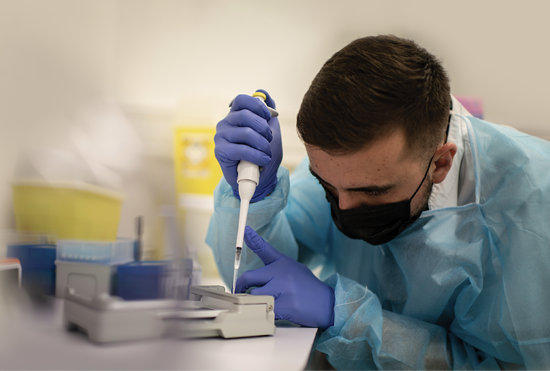
Next Generation Sequencing (NGS) is a valuable technology used to characterise and track infectious disease agents. Laboratory workers require highly specific knowledge and skills to conduct NGS. This course explained the end-to-end workflow of NGS, from sample preparation to the upload of genomic sequencing data to public-domain or public-access databases.
Photo Credits: WHO / NOOR / Olga Kravets
Idioma: English
COVID-19, Influenza
Información del curso
The world continues to be confronted by emerging and re-emerging infectious diseases that have increased in frequency in the last decade. Genomic surveillance using NGS can monitor the rate of evolution of pathogens, identify novel and re-emerging pathogens, alert on the spread of pathogens, and identify mutations in pathogens. Genomic sequencing data can help public health officials conduct contact tracing, determine the accuracy of diagnostics tests and the efficacy of vaccines and treatment, tailor interventions for the public, and develop countermeasures to slow or stop the spread of diseases. Therefore, it is imperative to train laboratory workers on the end-to-end workflow for NGS to scale up genomic surveillance and global genomic sequencing data sharing for infectious diseases, including influenza and COVID-19. The target audience for this course is laboratory scientists and technicians, laboratory managers and directors who make policies and protocols for their laboratories, and bioinformatics scientists seeking to gain knowledge on NGS.
Course Duration: Approximately 3.5 hours.
Certificate: A Certificate of Achievement will be issued to participants who score at least 80% of the total points available in all graded assessments. Participants who receive a certificate of achievement can also download an Open Badge for this course. Click here to learn how.
Lo que aprenderá
- Describe the pre-analytical processes for NSG;
- Describe the analytical steps for NGS;
- Explain the various NGS technologies and list their differences, strengths, and limitations;
- Conduct basic troubleshooting of NGS run;
- Explain the principles of genome assembly and phylogenetics and submit genomic sequencing data to public-domain or public-access databases;
- Describe the biology and evolution of influenza and SARS-CoV-2 viruses.
Contenido del curso
Introduction:
This introductory module gives an overview of NGS and its application.Module 1: Pre-analytical processes:
By the end of this module, you will: explain how to collect, transport, and store samples for molecular analysis; identify pre-analytical errors; identify sources of sample contamination, and describe the steps lab workers can take to prevent pre-analytical errors and contamination of specimens.Module 2: NGS analytical workflow:
By the end of this module, you will: describe the various specimen pre-processing steps for NGS; explain the different steps of NGS library preparation, and explain the quality controls procedures to be conducted during sample pre-processing and NGS library preparation.Module 3: Next-generation sequencing technology:
By the end of this module, you will: explain the Illumina and Oxford Nanopore NGS technology and list the advantages and disadvantages of each technology.Module 4: NGS tips and troubleshooting:
By the end of this module, you will describe the best practices during DNA library preparation and conduct basic troubleshooting.Module 5: Bioinformatics workflow for NGS:
By the end of this module, you will explain the principles of genome assembly and phylogenetics and submit genomic sequencing data to public-domain or public-access databases.Module 6: Influenza and SARS-CoV-2 viruses:
By the end of this module, you will describe the biology and evolution of influenza and SARS-CoV-2 viruses.Additional resources/ Existing guidance documents
Matricularme en este curso
Requisitos para el certificado
- Obtenga un certificado de estudios al obtener más del 80% del número máximo de puntos de todos los trabajos evaluados.
- Obtenga una insignia digitale abierta al completar el curso.